Pele: Five things we learned from the Netflix documentary
- Published
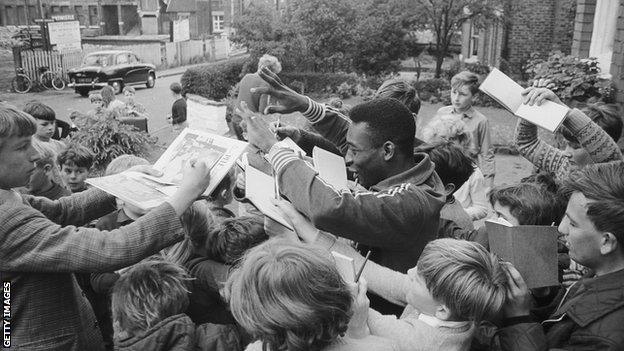
Pele is mobbed in Lymm, Cheshire, 1966.
The new Netflix documentary, Pele, takes us deep into the life of the man some regard as the best footballer ever.
Archive footage and interviews with the former Brazil great, plus with former team-mates and journalists, chart Pele's life - from the early days playing for Santos at 15, to being picked for Brazil at 16, scoring twice in the 1958 World Cup final victory at only 17 and going on to win two more World Cups by the time he was 30.
Here are some takeaways.
1. Pele admits he found it hard to stay faithful
After the 1958 World Cup, Pele became an icon. He was football's first millionaire and still a teenager.
Adulation followed him everywhere and it's hardly a secret that Pele did not show the same faithfulness to everyone in his life as he did to his club Santos.
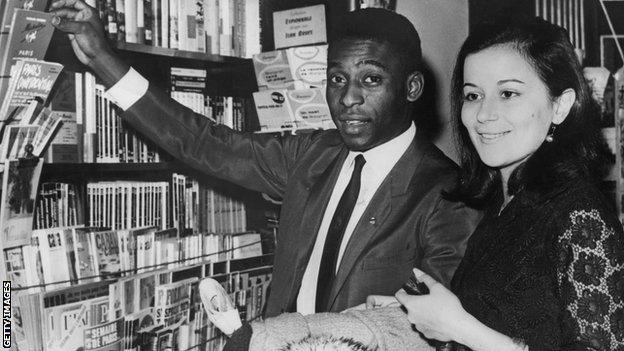
Pele and Rosemeri on honeymoon in Paris in 1966
At one point in the film, a journalist asks Pele whether he found it difficult to remain faithful with the amount of women flirting with him.
"In all honesty, it was," he says, "I've had a few affairs, some of which resulted in children, but I only learned about them later. My first wife knew all about it, I never lied to anyone."
He married his first wife, Rosemeri, in 1966, aged 25 and married twice more.
2. Pele intended to quit after the 1966 World Cup
Brazil went to the 1966 World Cup as favourites, having won the competition four years earlier in Chile. However, there was a massive shock when they were knocked out in the group stages.
"Getting knocked out of the World Cup in England was the saddest moment of my life," Pele says.
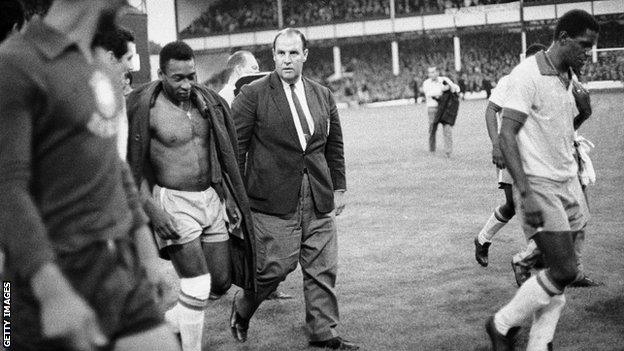
A dejected Pele leaves the field at Goodison Park after Brazil are beaten 3-1 by Portugal
Despite being only 25 at the time, Pele decided he was done with the tournament.
In the film, he tells a reporter: "I don't intend to play in any more World Cups, because I'm not lucky in them. This is the second World Cup where I have been injured after only two games."
He played one more World Cup - the 1970 tournament in Mexico, which Brazil won. He's still the only player to have won three World Cup trophies.
3. He was criticised for not taking a political stance
In 1964, the Brazilian military staged a coup, which led to a dictatorship being established in the country that lasted until 1985.
Torture and repression were institutional.
In the film, Pele is asked whether he knew about these practices at the time.
"If I were to say now that I had never been aware of it, that would be a lie," he says. "There was a lot we never got to find out, but there were many stories too."
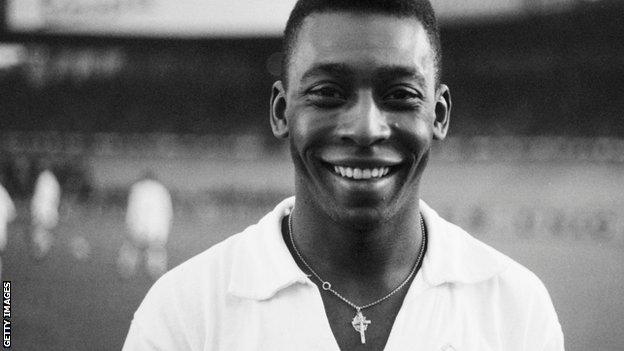
Pele signed for Santos in 1956 as a 15-year-old and played there until 1974
However, the film paints him as taking a neutral stance throughout, never criticising the regime. Former team-mate Paulo Cezar Lima - aka Caju - doesn't forgive him.
"I love Pele but that won't stop me criticising him. I thought his behaviour was that of a black man who says 'yes sir'," said Caju. "A submissive black man. It's a criticism I hold against him until this day, because just one statement from Pele would have gone a long way."
4. There may have been government interference in the Brazil team
The film paints a picture of how national team's exploits were used to launder the reputation of the military regime during the 1960s.
Before the 1970 World Cup, a journalist and friend of Pele's, Juca Kfouri, describes how it became very important for the regime's international image that Brazil win the World Cup again. And that meant Pele had to play.
"Winning the World Cup became a governmental matter," Kfouri says. "The team staff were almost entirely made up of military personnel.
"Pele doesn't like to talk about it, but there were messages from the dictatorship, telling him he'd better play at the World Cup."
Manager Joao Saldanha appears to have been fired in the lead-up to the 1970 World Cup for criticising the Brazilian president, telling a reporter: "I don't pick his ministers and he doesn't pick my team. That way we understand each other well."
5. Saldanha tried to have Pele removed from team
Before the 1970 World Cup there was concern that Pele's form had dipped and there was no love lost between him and Saldanha.
"He wanted to be the big man in charge but if you were to ask me whether he knew anything about football... personally, I'd say he didn't," says Pele.
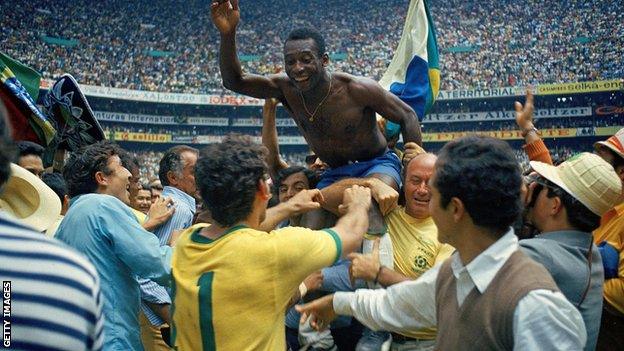
Pele retired from international football in 1971 aged just 30
Perhaps the most extreme incident came when Saldanha claimed an eye test showed Pele's sight had gone in order to have him removed from the team. In the film, Pele fumes at this "dirty trick".
Once Saldanha was replaced by Pele's former team-mate Mario Zagallo, things picked up for the striker.
Brazil beat Italy 4-1 in the 1970 World Cup final, with Pele scoring one goal and setting up two more.
Pele will be on Netflix from 23 February